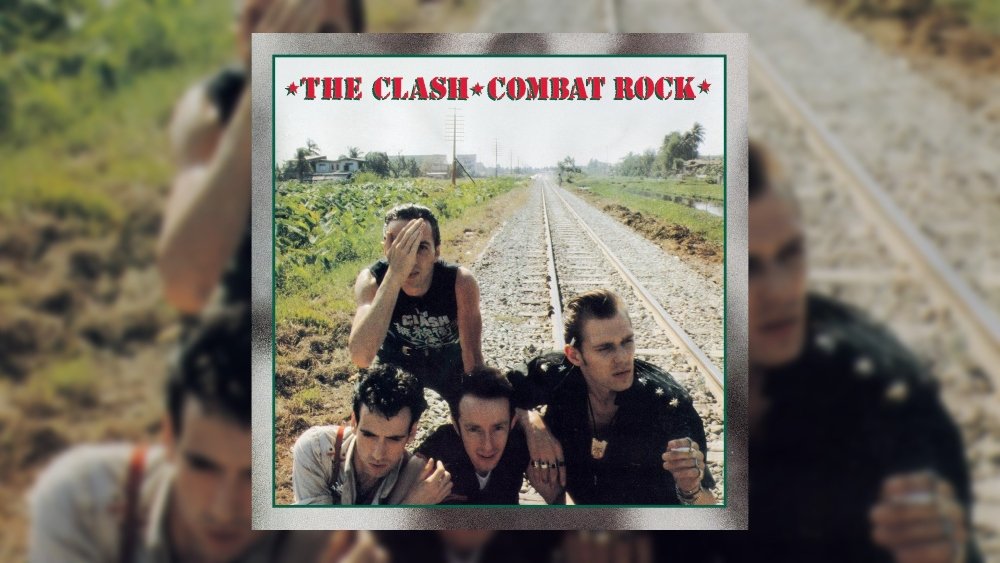Happy 40th Anniversary to The Clash’s fifth studio album Combat Rock, originally released May 14, 1982.
Released in May 1982, Combat Rock is The Clash’s fifth studio album, their best selling album and the last to include guitarist/vocalist Mick Jones and drummer Topper Headon. It was indeed their most polarizing work to date, within the band and among their fan base. I remember hearing hardcore Clash devotees refer to Combat Rock as their sellout album. They could not have been more wrong.
The album displays The Clash as a band that made impassioned statements about the times we were living in and how we got there. With this album, they somehow managed to limit the amount of anarchy and chaos pouring out of your speakers without compromising their message. The Clash toned down the excesses of their previous release Sandinista (1980), a three album opus that vacillated between brilliance and a muddled mess. They hired veteran producer Glyn Johns to produce the album, his steady hand and experience leading them to cut Combat Rock down from a double album called Rat Patrol from Fort Bragg to a single album.
Combat Rock is so much more than just “Should I Stay or Should I Go” and “Rock the Casbah.” The band were big fans of the movie Apocalypse Now and they had a great fascination with the Vietnam War. As a result, several of the album’s songs are meditations on the war and its impact on society. “Straight to Hell” tells the story of Vietnamese women and their children whose fathers were American soldiers who eventually abandoned them. “Sean Flynn” is another Vietnam-themed tale about the son of actor Errol Flynn who was a photojournalist who disappeared in 1970 while in Vietnam.
The Clash spent much of 1981 and some of 1982 in New York and many of the songs on Combat Rock have a very distinct New York influence and feel to them. One of these songs is "Red Angel Dragnet,” a tune that was inspired by the shooting death of Frank Melvin, a member of the Guardian Angels. The song incorporates quotes from Martin Scorcese’s Taxi Driver with The Clash’s longtime associate and sometimes manager Kosmo Vinyl imitating the voice of the movie’s main character, Travis Bickle.
“Overpowered By Funk” is a song that illustrates the heavy influence that hip-hop (then referred to as rap) had on the band. Joe Strummer recalled in 2002, “When we came to the U.S., Mick stumbled upon a music shop in Brooklyn that carried the music of Grandmaster Flash and the Furious Five, the Sugar Hill Gang…these groups were radically changing music and they changed everything for us.” The song features a rap vocal by legendary graffiti artist Futura 2000. It captured the mood and feel of New York City in 1982 and it gave us a glimpse into Jones’ musical future with his band Big Audio Dynamite. The dark side of New York is on display in “Ghetto Defendant,” a reggae dub track featuring Beat poet Allen Ginsberg. It’s an ominous tale about heroin addiction and despair. Ironically, it was heroin addiction that forced the band to fire drummer Topper Headon after the album’s release.
The Clash were never shy about making political statements and “Rock the Casbah” is no exception. It was intended to be a song about the banning of rock music by Muslim fundamentalists in Iran, but like all really cool things, it got co-opted by people who completely missed the message. “You know the U.S. military played this song in the first Gulf War to the troops and now are using it again as they prepare for war,” Strummer shared, “this is just typical and despicable.” Also, in 2006, “Rock the Casbah” was named one of the 50 Greatest Conservative Rock Songs by the National Review.
The biggest triumph of Combat Rock was that The Clash were able to sell tons of records with an album that was complex and more different than anything else on the charts at the time. They gave us an album that was a lyrically smart assessment of the state of affairs in the United States that no American act besides Grandmaster Flash & The Furious Five (“The Message”) would dare attempt.
The various styles of music on Combat Rock were emblematic of the drifting apart of Strummer and Jones. “Know Your Rights” is Joe Strummer personified and one hell of a way to kick off an album. The song exemplified the direction he wanted the band to go. Strummer thought they needed to get back closer to their punk roots. The stylistic tug of war on Combat Rock works with the heavy subject matter. Unbeknownst to us at the time, it was the last great statement from The Clash as we knew them. When the Combat Rock tour ended, Strummer and the band’s manager Bernie Rhodes forced Jones out of the band. Strummer confided in 2002, “I committed one of the greatest mistakes of my life with the sacking of Mick.”
Combat Rock’s legacy lives on years after its initial release, with the most notable example being “Straight to Hell”, which was sampled in M.I.A.’s 2007 song “Paper Planes.” Combat Rock may be one of the most misunderstood albums of all time. The band’s hardcore fans wanted more of what London Calling was and The Clash wanted to grow and explore. In the long run, I think we were the better for it.
Enjoyed this article? Read more about The Clash here:
The Clash (1977) | London Calling (1979)
LISTEN:
Editor's note: this anniversary tribute was originally published in 2017 and has since been edited for accuracy and timeliness.

